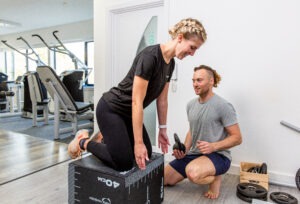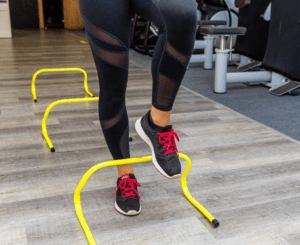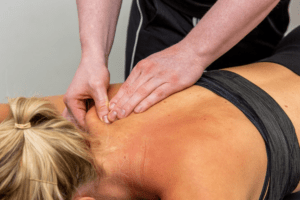What is Frozen Shoulder?
Frozen shoulder, also known as adhesive capsulitis, is a condition that affects the shoulder joint. It is characterised by pain, stiffness, and limited range of motion, which can significantly impact daily activities and quality of life. The shoulder joint is surrounded by a capsule which is encased by your rotator cuff tendons and muscles. These structures offer support to the shoulder joint and enable its movement. When the shoulder capsule becomes thickened and inflamed, this is frozen shoulder. This blog will delve into the causes, symptoms, and available treatments for frozen shoulder, offering you a comprehensive understanding of this challenging condition and giving you useful insight into how you can identify if you may have this condition and how you can manage it.
What causes Frozen Shoulder?
The exact causes of Frozen shoulder are still unclear. In some cases, the onset can seem to have no underlying cause. This is known as primary or idiopathic frozen shoulder. However, if there are some known potential underlying causes, such as a history of trauma to the shoulder, surgery, or a past rotator cuff injury, this is known as secondary frozen shoulder. Additionally, although the link remains unclear, medical conditions including diabetes, heart disease, and thyroid disorders have been associated with an increased likelihood of developing frozen shoulder.
Symptoms of Frozen Shoulder:
Recognising the symptoms of frozen shoulder is crucial for early diagnosis and effective management. The condition typically progresses through three stages. It must be noted that these stages can overlap and it is not always a linear progression through the phases and not everyone will experience the same symptoms:
- Painful (Freezing) Phase: The initial stage is characterised by pain, especially with movement. The pain may be more pronounced at night, affecting sleep.
- Stiffness (Frozen) Phase: As the condition progresses, stiffness in the shoulder joint becomes more apparent. This stiffness can severely limit the range of motion. Daily activities such as reaching for objects or even getting dressed become challenging.
- Resolution (Thawing Phase): In this phase the stiffness gradually eases and the shoulder function will slowly begin to return.
It is also important to highlight and manage your expectations of the length of time it can take to recover from frozen shoulder. For most people a frozen shoulder typically resolves within 18 months but it can be quicker for some people or longer for others. We, at tops:health are here to give you evidence-based advice, guidance and rehabilitation plans to help to ensure you get optimal rehabilitative outcomes.
How is frozen shoulder Diagnosed?
If you suspect you have a frozen shoulder, you can consult with a member of our team at tops:health. An early diagnosis can really improve the speed of your recovery. Diagnosis typically involves a physical examination and a review of medical history. One of the main diagnostic tests that is indicative of frozen shoulder is passive external rotation; rotation away from the body.
Usually, imaging tests such as X-rays or MRI scans are not required for the diagnosis of frozen shoulder. However, in some cases further imaging by be considered to rule out other potential differential diagnoses.
What are the Treatment Options Available?
- Movement! Try to keep the shoulder moving as normally and as much as possible. Some activity may be painful, but you want to encourage normal functioning of the shoulder. It is important to listen to your body.
- Physiotherapy: Physiotherapy can play a role in managing frozen shoulder. Specific exercises can help improve flexibility and reduce stiffness. One of our team at tops:health can effectively assess you and factor in your personal needs and goals into your rehabilitation plan.
- Medications: Pain relievers and anti-inflammatory medications may be prescribed to manage pain and inflammation. For advice on medications, we recommend that you consult your GP.
- Heat and Ice: Applying heat or cold packs to the shoulder can help alleviate pain and reduce inflammation.
- Hydrodilation: In some cases, a doctor may use a procedure called hydrodilation. This involves using ultrasound or X-ray imaging to guide an injection of sterile water (saline) and local anaesthetic into your shoulder joint capsule to stretch it to create space in the joint and promote normal function.
- Corticosteroid Injections: Injections of corticosteroids into the shoulder joint may help reduce inflammation and alleviate pain. This is usually done if there has been no response to conservative management or if the pain is severe.
- Manual Therapy: One of our sports massage therapists or physiotherapists may mobilise the shoulder joint to help to relieve pain or stiffness and encourage normal shoulder movements.
Frozen shoulder usually recovers on its own in time. However, this can sometimes take a couple of years to fully recover. The aim of physiotherapy and other treatment modalities is to reduce pain and improve the range of movement of your shoulder.
How can frozen shoulder be prevented?
While it may not be possible to prevent frozen shoulder entirely, certain measures can reduce the risk:
- Regular Exercise: Engage in regular, gentle exercises to maintain shoulder flexibility and strength.
- Effective Strengthening and Rehabilitation after a past trauma or surgical procedure you may have had on your shoulder.
- Control Underlying Conditions: Managing conditions like diabetes or heart disease can contribute to overall shoulder health.
- Early Intervention: Seeking medical attention at the first sign of shoulder pain or stiffness can prevent the condition from progressing to more severe stages.
- Manage expectations and be patient. We know this can be challenging and we will be here to support you every step of the way. Some people find it useful to track and monitor their recovery on a regular basis to help to stay motivated. It can take time, but things will improve.
Conclusion:
Frozen shoulder can be a challenging and painful condition, but with early diagnosis and appropriate treatment and rehabilitation plans, many individuals can experience significant improvements. If you suspect you have a frozen shoulder or are experiencing shoulder pain, you can consult with a member of our team for a comprehensive evaluation and personalised rehabilitation plan to get you back to doing things you love pain-free.



